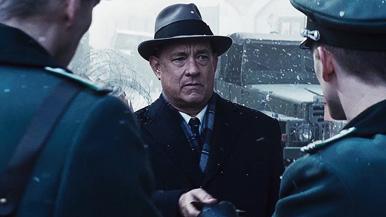Movie Review: Bridge of Spies
By Matthew Huntley
October 22, 2015
As it turns out, in a parallel plot, the U.S. military recruits a group of air force pilots for a mission to fly custom jets over the Soviet Union and take pictures using highly sophisticated cameras. One of these pilots is Francis Powers (Austin Stowell) and during his endeavor, the Soviets shoot him down, but rather than self-sacrifice like he was told, Powers ejects himself and is subsequently captured. Later on, in an unrelated case that will eventually relate to both Powers’ and Abel’s, an American graduate student named Frederic Pryor (Will Rogers) is arrested in East Germany on suspicions of being a spy just as the German Democratic Republic is erecting the Berlin Wall.
Because of Donovan’s personal connection with Abel, the Federal Governments asks him to go to East Germany as a “private citizen,” and not as a representative of the government, to speak with the Soviet ambassador. His objective: strike a deal that would exchange Abel for Powers. But upon hearing about Pryor, Donovan takes it upon himself to take the deal even further and, in separate negotiations, asks that the Germans release Pryor as well. So he makes it his own mission to have the Soviets release Powers and the Germans release Pryor, both in exchange for Abel, whom both Germany and the Soviet Union have a vested interest.
History aside, the drama and suspense of Bridge of Spies stems from Donovan’s sheer will and whether or not his convictions will survive the odds and stakes that are pitted against him. The film paints him as an obvious hero and good guy, and Hanks, as usual, lends the character an everyman, down-to-earth quality. Naturally, we like and admire him, which is one of the reasons it’s so easy to get involved in this story. But in addition to that, Bridge of Spies shares the same kind of storytelling as Ridley Scott’s The Martian in that the plot continually adds hurdles for its characters to deal with and attempt to overcome. Just when we think things are going to play out smoothly and in their favor, new dilemmas arise, and we’re honestly not fully convinced Donovan’s determination and strategy will win out, which makes it all the more engaging. Of course, there’s the lingering notion that because this is, in fact, a mainstream Hollywood movie, the ending will inevitably be a happy one, but Spielberg and his writers don’t make it an all-out guarantee, and that’s what makes it so watchable right up to a key scene that takes place on two different bridges in Germany. The tension builds and builds until finally…
Well, I won’t reveal what happens, but I will say the film pays off both dramatically and as an intriguing historical document. It’s also a crowning technical achievement, with production designer Adam Stockhausen, who won a well-deserved Oscar for The Grand Budapest Hotel, creating a dark, brooding atmosphere and faithfully recreating a 1950s New York City and Berlin that transports us to a different time and world altogether. You wouldn’t think a dramatic thriller would be so striking and absorbing on a visual level, but Bridge of Spies is.
I’m not sure how I feel about the film’s closing scene, which perhaps goes one step too far with its romance and bookending a previous shot just to bring the story full circle. This is the kind of Hollywood underlining that Spielberg sometimes finds hard to resist just so he can appease and bring comfort to the audience. Luckily, it’s more unnecessary than harmful, but I still wish he’d chosen a more subtle approach. Still, the essence of the story remains intact and the film serves as a veritable thriller as well as an intriguing history lesson.
Continued:
1
2
|
|
|
|




